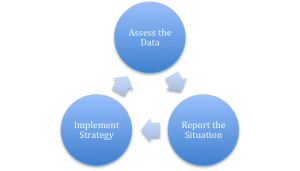By Misty Gaither
With news of layoffs, prolonged inflation, and the possibility of a recession, many business leaders are reexamining their strategies and prioritizing the most critical business initiatives. For many companies that means that DEIB (Diversity, Equity, Inclusion, and Belonging) initiatives are threatened, signaling that these efforts are still considered adjacent to the business rather than integral to the company’s operations. This also begs the question: Was there ever a strategy in place to truly transform DEIB?
For many companies, data-driven, actionable DEIB strategies are relatively new, brought on by the convergence of the pandemic and the social and political unrest of 2020. These commitments were filled with public promises to employees and customers. To immediately cut them at the first sign of economic hardship is a signal to employees that they were actually just as performative as the black squares posted across social media.
Of course, in uncertain economic times, all departments should reexamine their budgets. However, this can be done equitably, leveraging data that underscores the impact and outcomes of the DEIB initiatives. Scaling back on DEIB initiatives because they’re considered “optional” within a company’s budget reveals a lack of understanding of the signal it sends to employees, customers, and the community. Not only does it jeopardize the company’s commitment to diversity and inclusion, but it also risks negatively impacting its products and services.
There is convincing evidence that companies embracing DEIB achieve better financial performance. They see higher levels of innovation and accessibility in their products, more productive teams, engaged workforces, experience less employee turnover, are able to recruit from a larger talent pool, nurture more positive cultures, attract expanded audiences and consumers, and enhance their reputations.
For companies striving to succeed in today’s social and financial environment, DEIB is not a “soft” endeavor. Yes, it is the right thing to do from a moral perspective and social obligation, but it’s also the right thing to do from a business perspective. There doesn’t have to be a tradeoff while navigating a pending recession when DEIB is at the foundation of business operations.
One way to modify the shortsighted “slash the new stuff first” approach is to evaluate the overall strategy of designing and maintaining environments where everyone can thrive. For instance, using existing teams to examine equity and fairness in policies and organizational practices can become one of the primary drivers of the DEIB strategy and can be aligned to company-wide objectives and key results.
Another consideration would be to scale back on the number of partner organizations and sponsorship levels. Maybe you have been at the highest level, but need to adjust to a lower tier during this time period. If there are partner organizations that have learning components, upskilling, or professional development as a part of the sponsorship, consider a prioritization exercise to determine which sponsorships align best with your organization’s needs.

As leadership teams respond to current economic challenges, employees are watching and weighing the sincerity of their company’s DEIB commitment. This test should be taken seriously. All the progress of the last few years could be derailed by decisions that betray the promises made to employees who have been historically overlooked and allies.
Misty Gaither is the Vice President of Global Diversity, Equity, Inclusion & Belonging at Indeed.
(8)
Report Post







